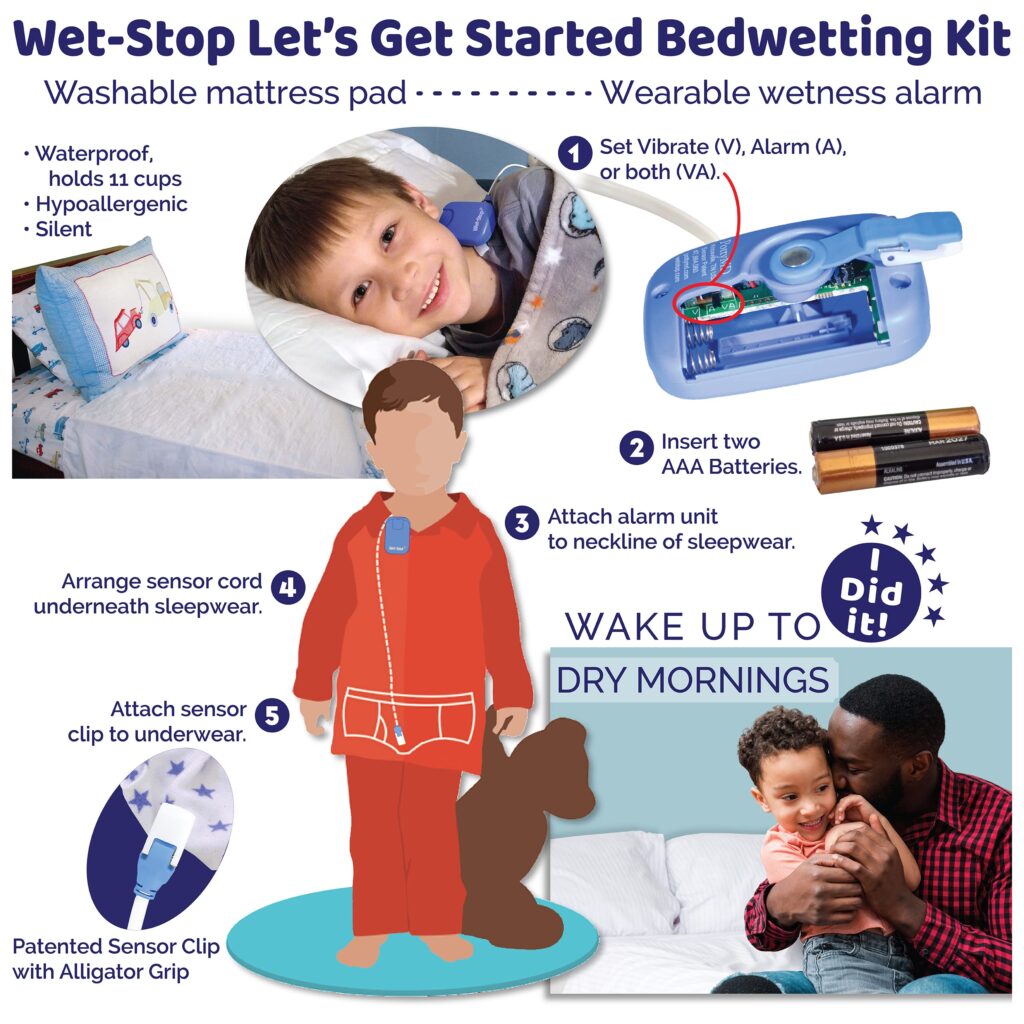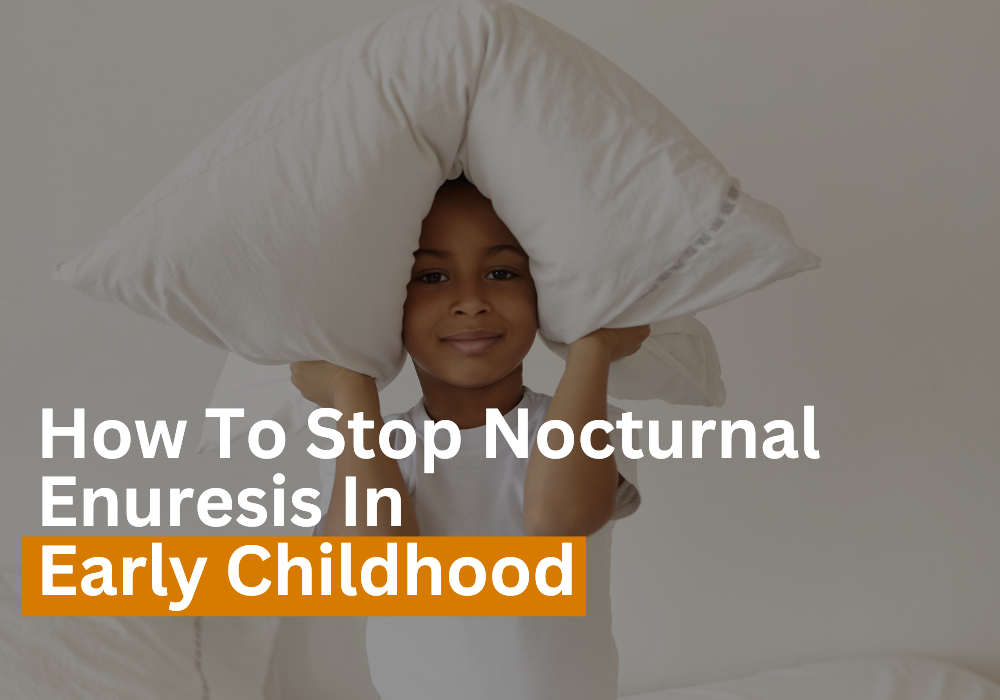How do you feel having to change your children’s sheets now and then simply because they will never stop wetting them?
I know how it feels because not only have I been there, but I have also used the practical experiences and the solutions I got over the years to counsel parents whose kids wet the Bed.
Many suggested strategies are out there on the internet about how to stop nocturnal enuresis in early childhood. My take on all of them is that they are never gonna be effective in stopping your children from bedwetting because although they seem okay, many of them are not written from personal experiences like mine.
In your quest to stop nocturnal enuresis in your child, you may have to test several strategies including ones suggested here in order to finally discover the one that work perfectly for you.
You may also like to read: How to Stop Bedwetting In Adults.
So, why must you trust my strategies for stopping children from bedwetting in early childhood?
- I have been there for years i.e. I have experienced what bedwetting is firsthand.
- You should trust my strategies because I learnt to overcome nocturnal enuresis in my children through practical experience derived from trial and error.
- You should trust my strategies because just like you, I have tried several other “solutions/Approaches” and none worked until I finally found what worked for me which I will be sharing with you shortly.
While most people will simply jump into trying to sell you strategies to stop nocturnal enuresis in children, a lot of them do not know there are types of bedwetting.
From experience, the solution to nocturnal enuresis in children begins with understanding the causes and types of Bedwetting.
There are a few facts about bedwetting no one has told you –
- From personal experience, children who bedwet are deep sleepers and are harder to wake up than children who don’t. From this therefore I have concluded also that deep sleep is a primary cause of bedwetting in children.
- There are two types of enuresis (Bedwetting), and since bedwetting is usually rampant at Night (Nocturnal), it is normal to continue to use the word Nocturnal enuresis. So, bedwetting/enuresis is divided into the primary nocturnal enuresis and the secondary nocturnal enuresis. The primary nocturnal enuresis describes the situation where the child has never had a period of dryness for more than 6 months. Secondary nocturnal enuresis on the other hand describes a child who stops bedwetting, only to go back into wetting the bed.
- Another cause of nocturnal enuresis or bedwetting in early childhood is the deficiency in a hormone called antidiuretic hormone or Vasopressin which ordinarily should help the child dry up at night.
There has to be DEEP SLEEP plus a deficiency in a child’s antiduretic hormone/vasopressin before bedwetting can occur……. and no one tells you that.
How to stop nocturnal enuresis in early childhood depends largely on the extent to which you understand how to treat these two underlying causes of nocturnal enuresis.
in the following paragraph, I will outline the best Approaches on how to stop nocturnal enuresis in early childhood.
Let’s get to it quickly.
How To Stop Nocturnal Enuresis In Early Childhood.
1. Stay Positive.
To finally help your children overcome nocturnal enuresis, you need to use a positive affirming approach. Helping your child to stop bedwetting is a whole lot of work, and you are never gonna be successful at it if you do not stay on top of the game—- Becoming positive.
At this tender age, Your child probably does not know the magnitude of the negative effects of having to wet the bed, talking about the health effects, financial effects, and subsequent/future psychological effects if they do not stop bedwetting. This is why you must become strong and resolute to find a lasting solution to it.
2. Use Behavioral Approach.
One thing you may not have been told is that your children get signals both from their bodies as well as from the bladder informing them of the need to empty, but it is never being triggered in the brain.
Begin to study what time of the night they wet the bed, and become proactive enough to wake them up before the time to pee. By religiously embarking on this behavioural method of stopping nocturnal enuresis in your children, you are only helping their brain to sharply respond to the triggers sent from their bladder and body, and this will soon become a part of them, given time.
Some examples of behavioural approaches to Stopping Nocturnal Enuresis in children include but are not limited to the following:
- Waking them up to pee after a diligent study and noting the time they let the bladder loose.
- Educating them on bedwetting and why they need to strive to stop it even though you know it is not going to be automatic.
3. Empower Your Child To Take Control.
It is not the best time to scold your child. By simply smiling and showing a good attitude toward them, you can simply make them realize that although what they have done isn’t right, it does not mean they have committed a capital offence.
By smiling and showing your bedwetting child a good attitude, you are also simply empowering them to stop bedwetting. Also, this helps to build a relationship with you and make them trust you.
4. Do Not Stop Them From Taking Fluids.
This is a big mistake I have seen people make and one almighty wrong advice I hear a lot of people give. A lot of people start to restrict their children from taking fluids especially in the evening or before going to bed.
Since you are aiming at employing the behavioural approach to stopping nocturnal enuresis which focuses on training the brain to respond to triggers from the bladder and body, you might want to encourage your children to take a lot of fluid to make the signal from the bladder to the brain very clear. You want to help the brain get a clear signal that it is time to wake up.
Stopping your child from taking fluid at Night isn’t going to stop them from bedwetting. Rather, by helping to train their brain to respond to signals from the bladder, you will have to encourage the intake of fluid as a requirment to train the brain.
5. Use A Very Loud Bedwetting Alarm.

Recall that I mentioned deep sleep as one of the causes of nocturnal enuresis, you may want to help your child become conscious of wetness as soon as they let open their bladder while sleeping.
A bedwetting alarm typically sets off when moisture touches the alarm pad.
I recommend a bedwetting alarm sold by Dr. Sagie’s Bedwetting Clinics. I have had a good experience using it for two of my children, and it helped to curtail their deep sleep. Apart from this, upon purchase, you simply enter your information, and a customized step-by-step & interactive program is designed & delivered immediately online to you and your child. This is particularly helpful because you are not getting the alarm alone and wondering how to use it plus if it will work for your purpose, you are getting a program designed specifically for your situation. You may click here to see the Latest Price on Amazon.
There have been different complaints about Bedwetting alarms not waking the child up even after they wet the bed, well, the alarms will wake the parents up to do the needful which is still very okay.
By using bedwetting alarms, you are not trying to stop your child from bedwetting, rather, you are simply working towards reprogrmming them to become clean and dry.
6. Assign Tasks To Them No Matter How Little.
As soon as the bedwetting alarm goes off signifying that your child has peed on the bed, your next mission is to head straight to them to keep them neat and dry.
You have to wake up in the middle of the night to attend to your child who has just let open his/her bladder.
At this point, you have to assign simple tasks to them depending on their age. Some of these tasks include:
- Make them hold the wet bed sheet while you lay a new one.
- Getting them to pull their wet clothes themselves
- Making them take those clothes to the laundry room immediately.
At this point, all they simply want to do is sleep back, but you won’t let that happen. Instead, you are saddling them with these little tasks to send a signal of pain to the brain. As this routine continues, the brain will choose to sharply respond to the signal coming from the bladder rather than deprive itself of that sweet sleep.
Read Also:
7. Consider Hormone Improvement Medications.
Recall I mentioned that a deficiency in the antidiuretic hormone or Vasopressin is one of the biggest causes of bedwetting in children. This deficiency can be adequately treated by taking medications, only ensure you meet with your doctor to discuss what’s best for your child.
Is enuresis curable?
Yes, Enuresis is curable either in children or in elderly people. For children, enuresis is usually outgrown by the time they reach 13 to 19. Most experts have discovered that only a minute number, about 1%, have a persistent case of enuresis into adulthood.
So far, I have outlined and explained 7 Proven Approaches How To Stop Nocturnal Enuresis In Early Childhood. These approaches have worked for me, and this is where I draw my confidence to recommend them to you too.
You can drop me a comment below about nocturnal enuresis in early childhood and I would gladly reply. Also, feel free to request a free chat with a therapist Here


